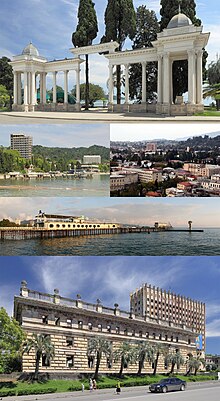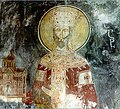Portal:Abkhazia
The Abkhazia Portal
 |
 |

| |
Abkhazia (/æbˈkɑːziə/ ⓘ ab-KAH-zee-ə) officially the Republic of Abkhazia, is a partially recognised state, in the South Caucasus, on the eastern coast of the Black Sea, at the intersection of Eastern Europe and Western Asia. It covers 8,665 square kilometres (3,346 sq mi) and has a population of around 245,000. Its capital and largest city is Sukhumi.
The political status of Abkhazia is a central issue of the Abkhaz–Georgian conflict and Georgia–Russia relations. Abkhazia has been recognised as an independent state by Russia, Venezuela, Nicaragua, Nauru, and Syria; however, the Georgian government and nearly all United Nations member states consider Abkhazia a sovereign territory of Georgia. Lacking effective control over the Abkhazian territory, Georgia maintains an Abkhaz government-in-exile.
The region had autonomy within Soviet Georgia at the time when the Soviet Union began to disintegrate in the late 1980s. Simmering ethnic tensions between the Abkhaz—the region's titular ethnicity—and Georgians—the largest single ethnic group at that time—culminated in the 1992–1993 War in Abkhazia, which resulted in Georgia's loss of control over most of Abkhazia and the ethnic cleansing of Georgians from Abkhazia.
Despite a 1994 ceasefire agreement and years of negotiations, the dispute remains unresolved. The long-term presence of a United Nations Observer Mission and a Russian-led Commonwealth of Independent States peacekeeping force failed to prevent the flare-up of violence on several occasions. In August 2008, Abkhaz and Russian forces fought a war against Georgian forces, which led to the formal recognition of Abkhazia by Russia, the annulment of the 1994 ceasefire agreement and the termination of the UN mission. On 23 October 2008, the Parliament of Georgia declared Abkhazia a Russian-occupied territory, a position shared by most United Nations member states.
Abkhazia is heavily dependent on Russia: half of its budget comes from Russian aid and much of its state structure is integrated with Russia; it uses the Russian ruble; its foreign policy is coordinated with Russia; and a majority of its citizens have Russian passports.
Refresh
Selected article -
Sukhumi (see also other names below) is a city in a wide bay on the Black Sea's eastern coast. It is both the capital and largest city of the Republic of Abkhazia, a partially recognised state that some countries consider a part of Georgia. The city has been controlled by Abkhazia since the Abkhazian war in 1992–93. The city, which has an airport, is a port, major rail junction and a holiday resort because of its beaches, sanatoriums, mineral-water spas and semitropical climate. It is also a member of the International Black Sea Club.
Sukhumi's history can be traced to the 6th century BC, when it was settled by Greeks, who named it Dioscurias. During this time and the subsequent Roman period, much of the city disappeared under the Black Sea. The city was named Tskhumi when it became part of the Kingdom of Abkhazia and then the Kingdom of Georgia. Contested by local princes, it became part of the Ottoman Empire in the 1570s, where it remained until it was conquered by the Russian Empire in 1810. After a period of conflict during the Russian Civil War, it became part of the independent Georgia, which included Abkhazia, in 1918. In 1921, the Democratic Republic of Georgia was occupied by Soviet Bolshevik forces from Russia. Within the Soviet Union, it was regarded as a holiday resort. As the Soviet Union broke up in the early 1990s, the city suffered significant damage during the Abkhaz–Georgian conflict. The present-day population of 60,000 is only half of the population living there toward the end of Soviet rule. (Full article...)Selected image
Selected biography -
List of selected biographies
|
|---|
General images
Did you know?
- ...that the Voronya Cave in the Arabika Massif is currently the world's deepest cave and that its complete depth has not yet been established?
- ...that Lavrentiy Beria, the feared head of the Soviet NKVD, was born in the village of Merkheuli and that he went to school in Sukhumi?
- ...that during the Orange Revolution in the Ukraine, Abkhazia witnessed a very similar political crisis following the 2004 presidential election, which lasted twice as long?
- ...that there is a tiny community of Afro-Abkhazians, descendent from slaves bought centuries ago from the Turks?
Related portals
Things to do
WikiProjects

- WikiProject Abkhazia – a project to improve all articles related to Abkhazia.
- WikiProject Limited recognition – a project that seeks to improve coverage of entities with limited international recognition.
Associated Wikimedia
The following Wikimedia Foundation sister projects provide more on this subject:
-
Commons
Free media repository -
Wikibooks
Free textbooks and manuals -
Wikidata
Free knowledge base -
Wikinews
Free-content news -
Wikiquote
Collection of quotations -
Wikisource
Free-content library -
Wikiversity
Free learning tools -
Wikivoyage
Free travel guide -
Wiktionary
Dictionary and thesaurus
External media
Portals





![Image 3Enguri Bridge [ru] over the Enguri river (from Abkhazia–Georgia border)](http://upload.wikimedia.org/wikipedia/commons/thumb/9/9d/Enguri_River_Bridge_2018013.jpg/120px-Enguri_River_Bridge_2018013.jpg)


![Image 6Enguri Bridge [ru] over the Enguri river border (from Abkhazia–Georgia border)](http://upload.wikimedia.org/wikipedia/commons/thumb/4/48/Russian_military_post_at_the_administrative_boundary_line_of_Abkhazia%2C_2016.jpg/120px-Russian_military_post_at_the_administrative_boundary_line_of_Abkhazia%2C_2016.jpg)

















